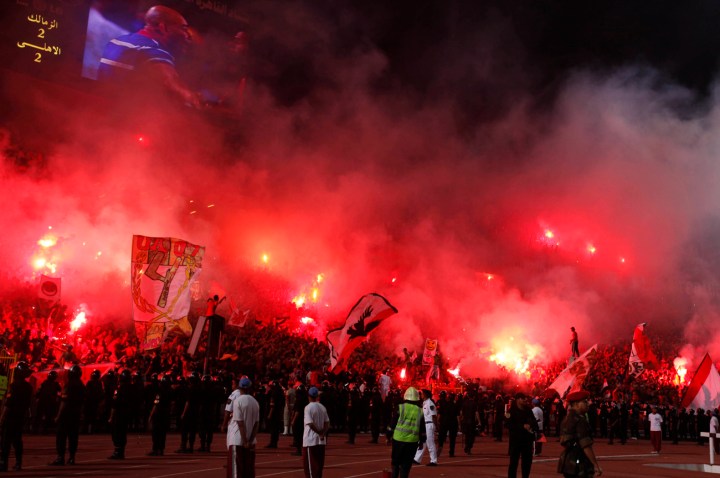Africa
Football and Egypt’s hooligan revolutionaries

As they ripped up stadium seats and showered police with urine, it was hard to remember that the hooligan supporters of Egypt’s top football clubs were on the frontlines of the revolution. But after besting police in running street fights, it was easy to see to why they remain one of the transitional government’s biggest headaches. By SIMON ALLISON.
The organised hooligan elements of Al Ahly, Egypt and Africa’s biggest and most successful football club, are enjoying the post-Mubarak era. Every weekend, the terraces in Cairo Stadium rock with chants that are only possible in the new Egypt. “Fuck the mother of Hosni Mubarak,” goes one. And to the ranks of police stewards in the stadium: “Go fuck your minister, Habib al Adly,” a reference to the former interior minister and police boss, who is co-accused in Mubarak’s trial.
As is custom, the police circle the field with their backs to the action, eyes firmly trained on the fans. Understanding that power has shifted, most match-days they stand there and take the abuse. But not on Tuesday night. Al Ahly were playing Kemi Aswan, and the action on the pitch was less entertaining than policeman-bashing. Seats were broken, firecrackers were lit, bottles were thrown.
“The fans slapped the policemen on the back of their heads and threw plastic bottles at them containing urine,” said a government representative later. “The police are subjected to constant assaults everywhere and we are doing our best to exercise self-restraint. I don’t know why those fans are acting fiercely.”
This time, the police lost their patience. As the match ended with a resounding victory for Al Ahly, the lights in the stadium went out and police advanced with sticks, chasing fans out of the stadium and along a nearby road. In the course of the clashes, more than 70 people were wounded – most of them policemen.
The hardcore fans of Al Ahly, as well as those of their archenemies Zamalek, have never had a good relationship with the police, although they’ve never before been able to challenge them to such a degree. In the stifled, oppressive political atmosphere of Mubarak’s Egypt, football gangs were one of the few areas where young men could channel their emotions, and violence has long been an integral part of Egypt’s football culture – usually, it’s been directed at the support of opposition teams. Mubarak’s security forces tolerated them, mindful of giving a frustrated population some outlet for expression, but were nervous of their growing popularity.
“The more they tried to put pressure on us, the more we grew in cult status. The [interior] ministry and the media, they would call us a gang, as violent,” said Assad, a leader of the Al Ahly ultras, in an interview with CNN. “It wasn’t just supporting a team; you were fighting a system and the country as a whole. We were fighting the police, fighting the government, fighting for our rights…this was something new, a little bit of a seed…”
And as popular momentum gathered behind Egypt’s revolution earlier this year, Al Ahly and Zamalek ultras temporarily put aside their differences and came out openly against Mubarak. In the revolution’s fiercest battles against pro-Mubarak forces, be it against the police or the rent-a-militia recruited to quell the uprising, the ultras were on the frontlines, using their street-fighting know-how to help organise the fightback.
“I don’t want to say we were solely responsible for bringing down Mubarak,” Assad said. “Our role was to make people dream, letting them know if a cop hits you, you can hit them back. This was a police state. Our role started earlier than the revolution. During the revolution, there was the Muslim Brotherhood, the activists and the ultras. That’s it.”
Football hooligans are rarely on the right side of history, in other countries attracting a particularly right-wing reputation, as evidenced last week in Bulgaria where black English players were subjected to racist abuse from certain sections of the home crowd during a Euro 2012 qualifier. But their influence in Egypt has been strong and largely positive, and in this strange interim period they are keeping pressure on the transitional government to deliver on the ideals of the revolution and not revert to a police state.
In addition to police-baiting, Egyptian ultras are guarding the families of people who died in the revolution from any possible police vengeance. And they’ll be out in force this Friday in Tahrir Square, where another million-man march is planned to put pressure on the transitional government to implement reforms.
But all this political action doesn’t mean that Egypt’s ultras have put their own differences behind them. The derby between Al Ahly and Zamalek remains one of the most volatile in world football, and amid Egypt’s chaos and instability, that’s one thing that won’t change any time soon. DM
Read more:
- Sept 9th Friday of Anger set to intensify as Egypt’s football ultras vow to settle score with police in Egypt’s Al Ahram;
- Egypt’s revolutionary soccer ultras: how football fans toppled Mubarak on CNN;
- Egypt police attack fans after anti-Mubarak chants on Egypt’s Bikya Masr.
Photo: REUTERS



















 Become an Insider
Become an Insider